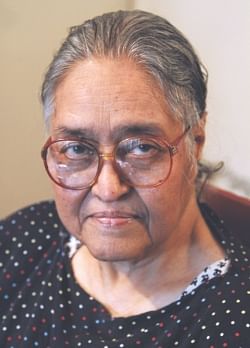| Home - Back Issues - The Team - Contact Us |
 |
| Volume 11 |Issue| 15 | April 13, 2012 | |
|
|
Profile A Pathbreaking Scientist Soraya Auer
Some people give up when difficulties hinder their path to success, but for one young disabled girl in the 1950s, neither a disease, accident nor a family tragedy stopped her from becoming a successful and pioneering scientist in the following decades. Dr Flora Majid, former Chairman of Bangladesh Council of Scientific and Industrial Research (BCSIR), suffered from polio when she was just nine months old and has been physically disabled ever since. “They didn't realise what it was and said it was typhoid,” says Flora, who was born in 1939. “They gave me a straight brace for my leg and I would get blisters. It was painful but I could move around.” It was only during her PhD in the USA that Flora went to an organisation specialising in post-polio rehabilitation that she discovered the truth about her disability. “I had been wearing the wrong kind of brace my whole life,” she adds. While Flora's disability has undeniably affected her life's decisions, it has not stopped her from pursuing science with a passion. Her heart-warming laughter and modest nature almost camouflage her achievements as a student, woman, and scientist. She attributes her family for her strong work ethic and successful career. “My father used to always say, a rolling stone gathers no moss.” She explains, “He believed you shouldn't disturb your children in their study, and when you get a job, you should stick to it.” Her father, M A Majid, was a civil servant who lived by example. To stick to his job, he sacrificed time with his growing family of six daughters and two sons to relocate repeatedly. When Flora got a Fulbright scholarship to do her PhD at Michigan State University and the opportunity to travel with other Fulbright students, it was her father who encouraged her to fly the nest. “I had never been away from home and I didn't want to go,” remembers Flora. “My father told me that I needed to go and have the experience because I was very antisocial by nature.” As a child, Flora's eldest sister, Ruby, was a great source of inspiration. “She would motivate us to study by promising us a box of Black Magic chocolate. When I came first in my class, she didn't keep her promise and never gave me the Black Magic,” she chuckles as she reminisces, “because at that time Ruby got married and went off to Karachi. It wasn't her fault, but I was heartbroken.” Flora continued to be top of her class throughout her time at Quamrunnesa School and Eden Girls' College, Dhaka. “I got into Dhaka University (DU) and my major was in Botany and minor in Chemistry and Zoology. I found Botany and Zoology more related to life and I was weak in maths so I dreaded physics!” explains the former BCSIR chief. “When I started, I heard that no one had ever received a first class in Botany Honours. I had done so well in school that the teachers were optimistic for me.” But those chances were at risk in her final year of study when Flora went to visit her father who was working in Karachi. She fell from weak wooden stairs and fractured her hand and leg and had to relearn how to walk. “Before I fainted, I remember thinking how upset my father would be that I broke the stairs.” She adds laughing, “I woke up hours after to hear my father justifying my fall to the doctor, saying what a brilliant student I was!” Despite her injury and time away from study, Flora returned to DU and became the first student to receive a First Class Honours in Botany in 1960. While Flora's father encouraged her to excel, it was her mother she couldn't have succeeded without. “My mother was a wonderful person. She helped me a lot by doing the field work I could not. I would show her what I wanted and she'd collect the plants and the mushrooms, and my teachers knew all that.” She continues, “In Karachi, my mother collected algae from the sea and that was a really unique sample because no one from Dhaka University had done that.” Even while working at BCSIR, her bosses knew what an important role Flora's mother, Najmannessa Majid, played in her daughter's life. “When my mother would come to pick me up from the office, the chairman would stop the meeting to excuse me, saying 'your mother's here, you shouldn't keep her waiting!'” says Flora with a giggle. The Majid family supported Flora throughout her life but her strong attachment to her family almost resulted in her abandoning her PhD studies in the US in 1965. “I was in the middle of my exams when I got a letter from someone in Dhaka saying 'I'm sorry your sister Ruby has died in a car accident.' I was heartbroken,” Flora says, her cheery voice now subdued.
“I rang up my professor to say I didn't want to finish my studies, I wanted to go home. He said he wouldn't stop me but that my father had already suffered a great shock from losing a daughter, I would only give him another shock if I didn't finish my exams.” For the first time in two years, Flora called home and spoke to her parents and brother-in-law. All three insisted she finish her studies before returning, which she did in months. Once in Bangladesh, Dr Flora Majid began her research work with BCSIR Laboratories. “I had previously moved around teaching jobs and my father warned me I was a rolling stone, so when I worked at BCSIR, he was happy I was settling into a job,” says Flora. It was twenty years into Flora's career when the opportunity to work with spirulina arose. “I was working with mushrooms and other algae when a French scientist came and gave us [BCSIR] the project of cultivating spirulina in Bangladesh,” she remembers. “He taught us the basic technology of how to produce spirulina but we discovered it is microalgae that grows in hot countries, not monsoon areas.” The project proved unsuccessful and the French scientist left Bangladesh. “But we didn't give up because we got interested,” Flora recalls. “Through trial and error, we modified the medium of production and successfully found a way to grow spirulina without infection. “We were the first monsoon climate country to grow spirulina successfully, and we were the first to grow any microalgae at an industrial scale in Bangladesh,” states Flora, who won many international grants to pursue her research. Spirulina, which is very good for malnutrition and night blindness, is now produced commercially by more than six companies in Bangladesh and is well known for its richness in protein, vitamins, iron and beta-carotene. Throughout her life, Flora received multiple awards in the field of science. Bangladesh Academy of Sciences awarded Flora a gold medal in 1984, an honour she likened to getting an Oscar. Bangladesh Women Scientists' Association honoured her twice with gold medals and during her retirement in 2005, she was honoured by her old organisation, BCSIR, for her achievements. “By nature, I was always a little bit scared of life because of my handicap,” Flora admits. “And because I was weak in maths I thought I might not succeed as a scientist so whatever success came, I was grateful for it. I didn't expect it. I kept my ambitions small but possible,” says Flora, the first woman and first working scientist to hold the position of BCSIR Chairman. Despite not getting married, Flora lived a busy life married to her work and her family. “I was in love with Uttam Kumar, Clark Gable, Gregory Peck and Hemanta Kumar – they were all deep loves.” Since her retirement and the death of her mother in 1997, Flora has lived a quiet life in Dhaka. “After my mother died, I had a dream I was trying to get onto a rickshaw but couldn't,” says Flora. “She pushed me on it and then started to pull the rickshaw. I see that as symbolic of my life, my mother pushing and pulling me in all I did.” She adds, “I had a good life, and I'm grateful to Allah.” Dr Flora Majid's modesty is clear as she credits her successful career to her mother's support. However, her ability to break barriers and records comes down to her own determination to be the best she could be, defying the perceived confines of her sex and physical disability.
|
||||||||
|

